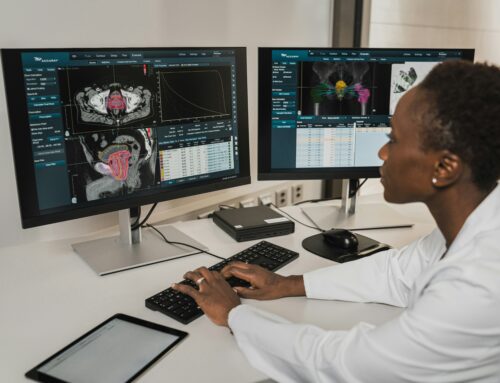Cancer is a disease that affects millions of people worldwide. Breast cancer is the most common cancer in women, both in developed and developing countries – an estimated of 2.3 million new cases worldwide in 2020. After acute treatment, maintaining emotional well being is crucial for both survivors and their caregivers. Survival rates are increasing, reaching 5-year rates for about 90% of the cases. However, many breast cancer survivors unfortunately experience emotional distress, psychiatric conditions, and reduced quality of life after treatment. In this context, one of the big challenges for cancer survivors is going back to work.
While many breast cancer survivors can return to work, a sizable number of women experience different kinds of impairments: persistent tiredness, cognitive issues, and economic problems after overcoming breast cancer. These conditions can affect their ability to go back to work. Some studies found that up to 21% of women under 57 years old treated for breast cancer did not return to work two years after diagnosis. Furthermore, breast cancer patients commonly experience swelling, joint or bone pain, and fatigue. Consequently, these conditions considerably affect their ability to work.
Going back to work as a cancer survivor
How long does it take to go back to work after surviving a breast cancer? Well, usually breast cancer survivors go back working as soon as the person feels ready to. In all cases, the recovery time is important, and survivors shall take as much time as needed in this phase. This is considered as a phase of transition, where breast cancer survivors can experience a range of emotions; fear, fatigue from treatment, anxiety or depression. On top of all this, they need to find how to go back to their “new normal.” Some women may want to get back to work as soon as possible, whereas others may have long term side effects that require a slower, phased return to work. Moreover, many women cancer survivors face physiological impact of treatment after overcoming cancer.
However, in many cases returning to work is forced choice due the need to work and economic difficulties suffered after going through a cancer stage, chemotherapy, and/or working in a small- or medium-sized company. Some studies showed that the survivors’ self-perception was weakened by the disease’s effects. With economic difficulties being a major reason for returning to work, breast cancer survivors can witness physical and psychological limitations, limited job adaptation measures, and little support from public administrations. In addition, women with reduced work ability usually receive little support from their employers and colleagues, and might face discrimination.
Improving cancer survivors’ working conditions
Overall, the risk of unemployment among cancer survivors is estimated to be 40% times higher than among people who have never been diagnosed with cancer. In the last years, a European workforce emerged to support employment for a growing number of breast cancer patients and survivors of working age. Within this workforce, women cancer survivors have been instrumental in advocating for workplace policies supporting employees with chronic illnesses. For example, in some countries in Europe, protecting cancer patients and survivors from workplace discrimination has included the establishment of disability discrimination legislation. Also, in the United States, the Disabilities Act (ADA) provides legal protections for individuals with disabilities, including cancer survivors. Additionally, many companies have implemented policies to support employees with cancer, such as flexible work arrangements and leave policies.
Nonetheless, women cancer survivors, similar to many cancer survivors, face unique challenges in their journey to recovery, including physiological barriers and difficulties returning to work. As we continue to work towards a future with better breast cancer treatments and outcomes, it is essential to recognize that not only the resilience and strength of women cancer survivors is important. In fact, it is pivotal to acknowledge that fighting cancer at a European level means fighting for improvement of conditions and workplaces that allow cancer patients and survivors to return to work, fulfilling their professional lives and enabling them economically productive opportunities. Thus, survivors can better build their “new normal.”
Advocacy of cancer survivors for improved work conditions
Currently, many cancer survivors have made significant contributions to the workforce and have been instrumental in advocating for policies helping to protect many cancer patients and survivors from workplace discrimination. Also, cancer survivors have created advocacy groups so they can better inform on how to advocate for their rights in the workplace. Hence, other survivors can better protect themselves from employment discrimination.
The aim of this article is to call the public’s attention to the challenges faced and support needed by breast cancer and all cancer survivors, when they are going back to work. We all need to be aware that going back to work might not be an option for all. It requires planning, as well as physical and social adaptation for the family and workplace. Although, cancer survivors shall look forward to returning to familiar and work routines, in many cases the physical, mental, and emotional effects of cancer treatment might change or delay these plans. Thus, cancer survivors’ need a more comprehensive legal and institutional protection and recognition to safeguard their well-being.
Authors: Xenia Beltran, Diego Carvajal, Laura Lopez – UPM – Universidad Politécnica de Madrid
References:
https://www.ncbi.nlm.nih.gov/pmc/articles/PMC8482782/
https://www.bcrf.org/breast-cancer-statistics-and-resources/
https://www.sciencedirect.com/science/article/pii/S1278321820303644
https://www.mdpi.com/1660-4601/19/21/14418
https://www.ncbi.nlm.nih.gov/pmc/articles/PMC8533326/
https://www.ncbi.nlm.nih.gov/pmc/articles/PMC7072532/
https://www.workingwithcancer.co.uk/wp-content/uploads/2017/11/EIU-Reports.pdf https://ecpc.org/wp-content/uploads/2020/07/Final-Cancer-Comorbidities-Joint-statement.pdf




